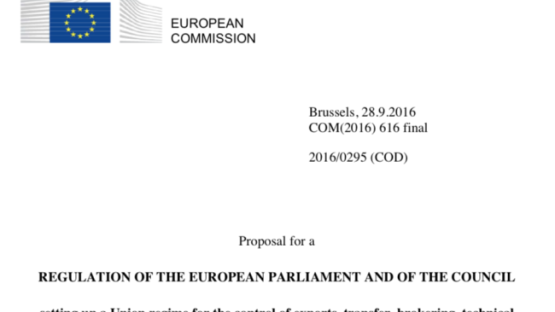Privacy International’s initial reaction to EU export control proposal

PI Research Officer Edin Omanovic said:
“The European Commission has proposed sweeping updates [PDF] to trade regulations in an effort to modernise the EU’s export control system and to ensure that the trade in surveillance technology does not facilitate human rights abuses or internal repression.
Privacy International welcomes the intentions of the proposed changes in terms of protecting human rights as it does all such moves. More than half of the world’s surveillance companies identified by Privacy International are based in the EU. Since 1979, when it was revealed that a UK company had provided the necessary wiretapping technology to the genocidal regime of Idi Amin in Uganda, there have been calls for safeguards over the trade in surveillance technology. Recently, Privacy International has reported the export of various surveillance technology used in human rights abuses in Uganda, Ethiopia, Egypt, Colombia, Morocco, Central Asia, Bangladesh, Macedonia, and Pakistan.
A previous version of the proposals was obtained and published last month by Euractiv. Privacy International at the time published an analysis of the leaked proposals as they related to surveillance technology, below. Since then, industry and national governments have been lobbying the Commission, which is in charge of formulating policy in the EU, to make changes. The eventual proposals only differ slightly however, with the main change being that the definition of “cyber-surveillance” technology has been narrowed. The actual annex which contains a detailed list of what technology has been subject to control has also been published. In addition to spyware used to infect devices, mobile phone interception tech, and mass internet monitoring centres, the Commission has proposed to add unilateral EU categories. Currently these are listed as telecommunications monitoring centres and lawful interception retention systems.
The proposals encapsulate the best and worst aspects of the European Union. Their stated intent reflects Europe’s commitment to fundamental rights, and — as a regulation — it will be binding on all member states, massively magnifying the effect of any legislation. However, they come five years after initial calls for reform made during the Arab Uprising, when it was revealed that the spying apparatuses of numerous authoritarian states largely relied on European surveillance technology. The policy making process has been marked by technical and bureaucratic complexities detached from individuals, making it vulnerable to the interests of industry, powerful national governments, and civil society.
Privacy International will be working to analyse the full implications of the proposal and to ensure that effective safeguards are eventually implemented, and encourages everyone to do so.”